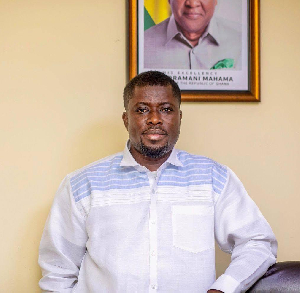The Good Friday has been celebrated in style in Accra. I watched a procession of someone acting as Jesus carrying a cross to his crucifixion. I have also taken some time to read the article of Mr. Boahene on “Traditionalists and not Christians deserve to celebrate Easter”. As a liberal Presbyterian and a freemason, I have found his article interesting for three reasons: I have acquired alternative knowledge about the origin of christianity. It made me think a bit about whether the Bible has been manipulated because the Roman Church hid it from everybody until the reformation. Two Charismatic pastors have mentioned Boahene’s articles in their radio broadcast. They seem to support his viewpoint that churches must reform otherwise they will lose spiritual authority. As expected, those pastors think that other churches must reform but not theirs.
Whether by coincidence or miracle I met Mr. Boahene on 9th April at Manchester Airport when I was returning from England to Ghana after a Christian ministry workshop. Mr. Boahene was also in Manchester for a conference on poverty alleviation that involved international development agencies, academics and politicians. We spent about an hour together. I talked to him about his motivation for his articles. I am writing to share with you the interview that I had with him. Some may find it challenging and others exciting. He is a pleasant man, and I think that Christians who feel uneasy about his articles will even like him when they meet him face to face.
Martin: Mr. Boahene, Easter is coming soon. I read that you are against Easter celebration, but do you have any message for Christians?
Boahene: I am not against Easter. I am in favour of celebrating Easter for the right purpose. Easter is the great holiday that the ancients reserved to commemorate the death and resurrection of God - Osiris, Mithras, Adonis and Tammuz. The Kwahus used to celebrate Easter before Christianity was brought there. I am honoured that the mysteries of our culture have become the cornerstone of the Christian faith. I pray that charismatic christians will take this occasion to reflect on the universality of God.
Martin: What are you going to do this Easter?
Boahene: I will celebrate Easter in the Netherlands. I will begin the Easter Friday with a prayer. After that, I will enjoy communion, which is eto (mashed plantain) with palm oil and boiled egg. On Saturday, I will attend a fundraising event of Kwahuman Association of the Netherlands in Amsterdam in aid of Atibie Hospital. The Kwahus in the Netherlands are emulating the good practices of their compatriots in the Kwahu Region in Ghana. The guest of honour at that function is the Ghana’s Ambassador to the Netherlands. Kojo Antwi and his Band are coming from Ghana to provide music.
Martin: You said, you will pray. Do you mean libation? Why do you use alcohol which Christians believe to be sinful?
Boahene: Let me remind you that wine has been an important aspect of ancient mysteries. I hope you are aware that your church celebrates communion with wine. At the wedding in Bethany, which I have understood was Jesus’ own, he instructed his servants to let the guests have enough to drink. Please read the Gospel of Mary, Gospel of Peter and Gospel of Philip, which the Roman Church banned to confirm this. This wedding was also reported in the Bible. Libation is the supreme way of communicating to God attested by ancient religions and taken over by Judaism. If you get the opportunity, read the book on libation by Archbishop Sarpong. It might be an eye-opener.
Martin: In your opinion, what is the most important thing that must change in Christianity?
Answer: There must be less dependence on miracles. God gave human beings the power to toil. There are some churches such as Presby, Roman and Methodist, which emphasise the importance of hard work. The unfortunate thing is that the charismatic churches, which are mushrooming in Ghana do expect God to perform even their daily household duties for them. Phrases such as “ask and you shall be given” (Matt 7:7) are used to justify that prayer can do everything. They have forgotten the useful advice contained in the Book of Proverbs, which Christian sarcastically called the Old Testament.
Martin: What do you think of the Bible?
Boahene: I am concerned about Christians who do not know the history of the Bible and yet believe that God inspired it. They cite a verse in the Letter of Timothy to support their claim. In AD 325 the Roman Church cast a lot (lottery) to classify part of the books as inspired and the rest not. For your information, the Book of Revelation was initially rejected but it managed to survive a second ballot by about two votes. There are other types of Bible depending on the motive of the person who assembled them. Let me give you one example. Mark was believed to have written two books that were read and accepted by earlier Christians under the authority of Bishop Clement. About 200 years later the Roman Church rejected one of the books because it presented Jesus in a more human way. This is how they joked with the writings that are now considered scared. The present Bible is a rich book with insightful legends and fables. It is not meant to be believed literally.
Martin: You seem to know the Bible well. Have you ever been a Christian?
Boahene: Oh yes, for quite a long time. As a child, the teachers caned us if we did not attend church service. At secondary school, they used to have a roll call. So I had no choice. I had belonged to many denominations, for a variety of reasons: I was a Catholic and Presbyterian because I attended mission schools. Later I joined SDA because I wanted to have some free days from farm work when I visited my uncle who took us to farm almost every day. I became a member of Church of Christ because it used to have a football team in my village that was open to their congregation only. Non-baptised people were not allowed to join them and play football.
Martin: Were you ever baptised?
Boahene: Yes, at the Church of Christ. I even became one the favourite preachers just three months after joining the Church. I was almost as fanatic as St. Paul. I did some good things for the poor in the Church and I am still proud of it.
Martin: Can you be more specific about those good things?
Boahene: For example, as a student, I helped to pay the school fees of some of the students in the congregation from poor homes. I was fortunate to have enough money than some of them. What happened at Church of Christ at that time is opposite of the present situation of the Charismatic churches. Now church leaders use deceptive means to take even the little that the poor have. I am no longer a member of the Church but when I go to my village I still meet with some of the church members to talk about their progress. By the way, Church of Christ does not belong to the charismatic church. Those christians are still my friends. Our friendship does not depend on whether they believe more in other foreign culture than the Ghanaian culture.
Martin: I am impressed that you do that. May God bless you. You compared yourself to Apostle Paul but he was faithful to Christ to death. Why did you stop?
Boahene: Honour belongs to my ancestors who have raised me with compassion. I stop believing in Jesus the moment I realised that I had been made to believe propaganda. The study took me about 5 years. I have no degree in Theology. I just studied for the benefit of knowing. Colonialism has indeed caused us great harm. Awareness is the best form of salvation. As I began to examine christianity I realised that christian myths grew from concepts and practices of non-christian religions, which existed thousands of years before Jesus was born. For example, Horus and Mithra were born of a virgin. Osiris, Mithra, Attis and Adonis died and resurrected. Dionysius turned water into wine. Aesculapius raised men from the dead and gave sight to the blind. Mithra celebrated communion with followers.
Martin: Are you not afraid that these beliefs can make you a prime candidate for hell?
Boahene: To which beliefs are you referring?
Martin: You say, that Easter was borrowed from paganism; and our Bible is not reliable. I have also read your articles that Jesus did not die on the cross?
Boahene: These are not beliefs. They are facts, which have been hidden from Christians for centuries by the Roman Church. If someone has been educated in ignorance about the true identity of Jesus, it is very difficult for him or her to realise or admit it. Many Ghanaians and other Africans tell me that when they were children, they believed that Israel and Palestine were in heaven. Now, as adults they turn back to tell me they have found salvation that is better than what I have.
Martin: Are you not afraid of hell?
Boahene: Do you mean hell as explained in the Bible?
Martin: Yes, exactly!
Boahene: How can I be afraid of something that does not exist? The Roman Church wanted to control people so they inserted fearful passages in the Bible such as eternal fire and condemnation. It does not make sense for a perfect God who does not know sin to commit murder by burning people forever and ever. The manipulators of the Christian Bible did not do a better job. Before the reformation, christians who wanted to avoid the eternal fire were asked to give their valuable possessions such as gold to the Church. Martin Luther challenged that. He tried to write his own Bible but was less successful before people had already believed the story told by the Roman Church.
Martin: How do you feel about the writings of Mr. Sophism?
Boahene: His jargons are amusing.
Martin: How did you feel when the deacon declare you a winner?
Boahene: It is nice that the deacon likes the articles and that he finds it useful. Many people I know who read his assessment agreed with him. I realised that the deacon is open-minded and willing to learn. That is the first condition of salvation.
Martin: Are you open-minded?
Boahene: That is a question for others to judge but I know that I can reflect on the sense in many things. I understand that all religion are equal because they lead us to God, but we have to acknowledge that the older religions have formed the basis of the new ones. Short-mindedness prompts people to claim that their religion is superior to others.
Martin: Can you predict the future of Christianity and Easter in Ghana?
Boahene: Charismatic churches will continue to grow as people become poorer. But as time goes on many people will be able to improve their living conditions substantially based on their own hard work. They will also realise that the Kingdom of God is not coming because it is not a physical event. Many will become effectively educated and the shackles of colonialism will be loosening. Then we will see the dawn of the end of Charismatic churches. The orthodox churches will flourish because increased education and prosperity will make people become philosophical, intellectual and fewer fundamentalists. People will overcome the myths of charismatic churches and they will see Christ as a symbolic figure for the good of the world as Bhudda is for some societies. I do not think there will be a dictator who will persecute christians unlike the Roman Church did to other religions in the past. The church will become a social organisation. Easter will continue to be celebrated by vari! ous people for many reasons. At least the Kwahus will be celebrating it. The sun has about 5 billion years to lose its energy. It is a long time to see these predictions fulfilled.
P.S. This is based on a recorded interview with Mr. Boahene. At the time of the interview, he agreed that I can make it public.
Martin Yeboah Amanfo
Presbyterian and Freemason, Darkuman
Opinions of Sunday, 20 April 2003
Columnist: Amanfo, Martin Yeboah Amanfo














